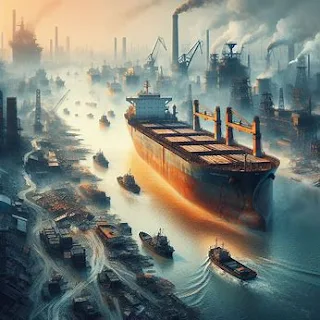The Ship Breaking Industry in Bangladesh: Navigating Economic Growth and Environmental Concerns
Introduction
Welcome aboard as we dive into the fascinating world of ship breaking in Bangladesh. This industry, which involves dismantling old ships for recycling and the recovery of valuable materials, plays a pivotal role in the country's economy. However, like any industry, it faces its fair share of challenges, especially in terms of environmental and safety concerns. In this article, we will explore the economic impact of ship breaking, the environmental and safety challenges it entails, and the future prospects for this industry.
Economic Impact
- Contribution to Steel Production: Ship breaking provides a valuable source of raw materials for the steel industry, with the recovered steel accounting for a substantial portion of the country's steel production. This not only reduces the dependency on imports but also supports the growth of the domestic steel industry.
- Boost to the National Economy: The ship breaking industry generates employment opportunities for thousands of workers, both directly and indirectly. This not only helps reduce unemployment rates but also injects money into local communities, leading to improved living standards.
- Global Standing in Ship Recycling: Bangladesh has emerged as a key player in the global ship recycling market. The industry in Bangladesh accounts for a significant share of the global ship recycling capacity, attracting ships from around the world for dismantling and recycling.
Environmental and Safety Concerns
- Workplace Safety: Ship breaking is a hazardous occupation, with workers facing risks from falling objects, toxic materials, and accidents during the dismantling process. Safety measures and training programs are essential to protect the workers and ensure their well-being.
- Environmental Hazards: The ship breaking process involves the handling and disposal of hazardous substances, including asbestos, PCBs, and heavy metals. Improper handling and disposal can lead to pollution of the surrounding environment, impacting both land and marine ecosystems.
Government Regulations and Initiatives
- Regulation and Compliance: The government has implemented regulations and guidelines that ship breaking yards must adhere to, focusing on worker safety, proper waste management, and environmental protection. Regular inspections are conducted to ensure compliance.
- Training and Awareness: The government, in collaboration with international organizations, provides training programs for workers and raises awareness about occupational hazards and safe working practices. This helps improve safety standards and reduce accidents.
Future Prospects
- Technological Advancements: The industry is exploring innovative technologies and processes to enhance worker safety, increase efficiency, and minimize environmental impacts. Automation and robotics are being considered for tasks that pose a high risk to workers.
- Sustainable Practices: There is a growing emphasis on sustainable ship breaking practices, including the safe disposal of hazardous materials, recycling of non-metallic waste, and reduction of carbon emissions. This will help improve the industry's environmental footprint.
- Diversification and Upgrading: The industry is exploring opportunities for diversification and upgrading, such as the development of shipbuilding capabilities and the establishment of ship repair facilities. This will help create a more comprehensive and sustainable maritime industry.





Comments